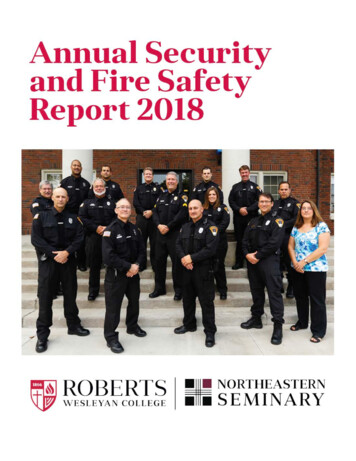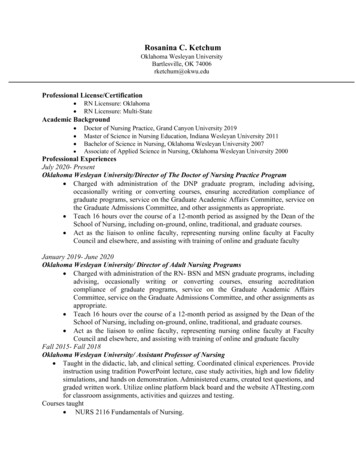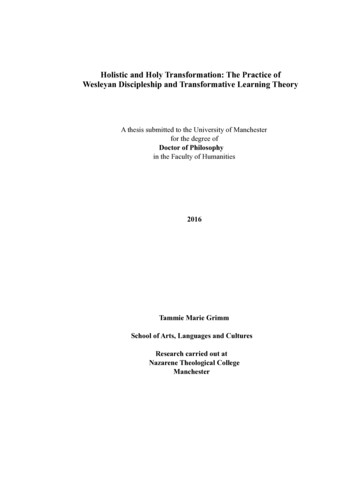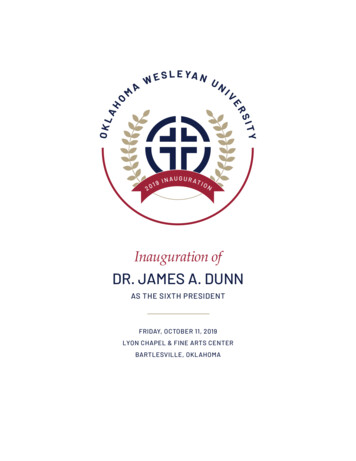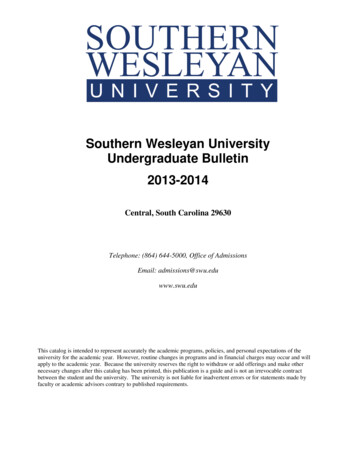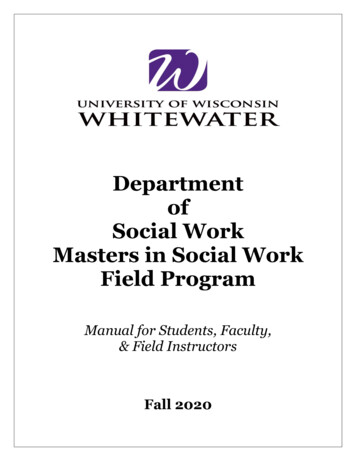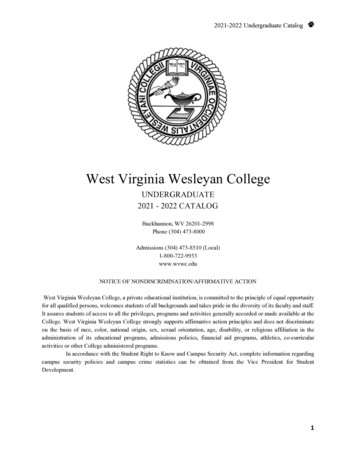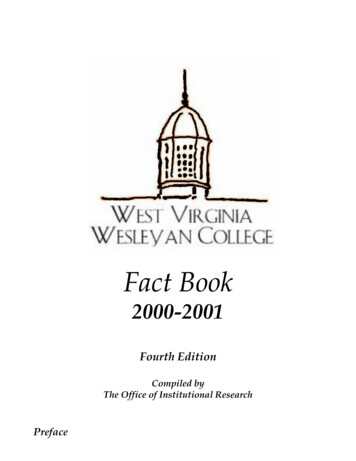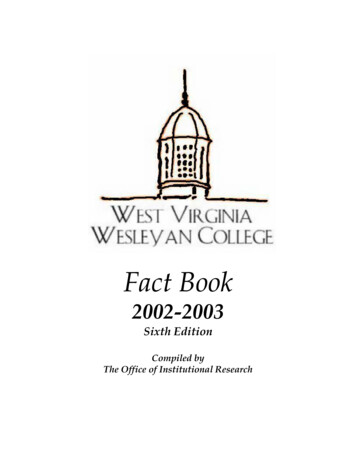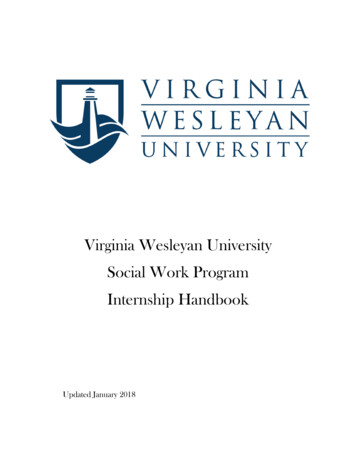
Transcription
Virginia Wesleyan UniversitySocial Work ProgramInternship HandbookUpdated January 2018
SOCIAL WORK PROGRAMINTERNSHIP HANDBOOKCONTENTSI.Introduction 1II.Rationale and Objectives of the Program . 2III.Application, Selection and Advising System . 3IV.BSW Core Competencies, Internship Assignments and the Learning Contract . 6V.Internship Time . 13VI.Roles and Responsibilities of the Students . . 15VII.Role and Responsibilities of Social Work Internship Director to the Agency 18VIII.Responsibilities of the University to Agencies 19IX.Administrative Responsibilities of Internship Director and University Personnel . 20X.The Agency Supervisor’s Responsibility to the Student . 22XI.Responsibilities of Agency Supervisor to the University 25XII.Requirements of the Evaluation Process . 26XIII.The Seminar . 27XIV. Partial Listing of Internship Sites . 28AttachmentsA.B.C.D.Application for Internship i-iiInternship Time Sheet . iiiOutline for Presentation of Agency . ivEvaluation—CSWE Social Work Competencies v-ix
I. INTRODUCTIONThis manual was developed as a guide for interns, agency supervisors, administrators andUniversity faculty. The manual defines specific requirements as well as broad guidelines. Themanual is structured this way to reflect areas in which there are unwavering standards andexpectations and areas which may be specific to a particular agency or learning situation.The aims of the Social Work program at Virginia Wesleyan University are: to provide a liberalarts education for those persons who wish to study the theory underlying social work generalistpractice; to prepare those who will enter graduate programs in the social work profession and tooffer appropriate training for those who will be employed in generalist positions in social worksettings.1
II. RATIONALE AND OBJECTIVES OF THE PROGRAMThe training of social workers has traditionally involved an extensive period of study during aninternship in the field. This experience involves working under the weekly supervision of anAgency Supervisor and performing functions typically performed by professionals in the agency.The Internship Director is involved in periodic conferences with the student and the AgencySupervisor to review the student’s learning and progress.The confluence of the liberal arts curriculum and the study of social work theory is the strengthof the Virginia Wesleyan program. While the social work professional is taught to work with theperson in the context of the environment using a biopsychosocial approach, the liberal artsbackground provides an understanding of individuals, their biology, history, culture, heritage,politics and influential systems which richly enhances understanding.The student spends time during the internship focusing on the integration of theory learned in theclassroom with experiential learning in the agency. In the Virginia Wesleyan program, studentsspend four hours per week on campus in a Seminar which focuses on the integration of theoryand practice, ethical considerations, professional behavior and peer group learning. Studentsmust grapple with the application of skills learned in theory in the real-world agency situation.In the peer group, students have the opportunity to learn from others’ experiences, which may bedifferent from their own. In addition, students learn the importance of the development of aprofessional resource network as they often share information about resources with one anotheror facilitate referrals between and among their agency programs.A strong supervisory relationship, supported by regular contact with the Internship Directormaximizes the learning process for the student. The integration of theoretical and experientiallearning is solidified in the Seminar while assignments are geared to the development of aprofessional identity and professional ethic.All these experiences are structured to prepare students to enter the field at the generalist level orenter graduate study conversant in theory, with well-developed skills and competence in ethicalpractice.2
III. APPLICATION, SELECTION AND ADVISING SYSTEMSocial Work students are accepted into internship following their successful completion ofprerequisite coursework (listed below) and endorsement by professors in the department, andother professors as appropriate. Students provide written permission allowing discussion of theirreadiness for internship among current and previous professors and agency personnel. Studentsapply for internship, completing the internship application available on the BSW programwebsite, during the spring semester of their junior year. Completion of this task is the first step inapproval of his/her readiness for the internship experience during the second semester of thesenior year. All students apply for internships during the fall semester of their senior year.To qualify for internship, the student must have a minimum 2.5 overall grade point average andsuccessfully complete prerequisite courses with a grade point average of 2.5 or better in eachcourse. Professional liability insurance is required and is purchased for a nominal fee inconjunction with SW 401 during the fall of the senior year.Successful completion of coursework does not automatically guarantee placement in theinternship. The Social Work Program Director, the Internship Director, the faculty advisor andother professors as appropriate will ascertain the student’s readiness for internship. The finaldetermination of appropriateness will be made by the Social Work Program Director andInternship Director.Students must continue to uphold all of the requirements outlined in the Student Handbook,Section II.; “Requirement for Admission to the Program.” In addition, should the student’sstrengths suggest better opportunity for success in another academic program; students will becounseled by their faculty advisor to determine the best course of action. Students’ rights toappeal these decisions follow part e. “Rights to Appeal” under Section II.Social Work Core Courses Prerequisite to Internship201 Introduction to Social Work (4) (S) Systems - General Studies RequirementAcquaints the beginning student with the history, philosophy, values, concepts, language,directions, problems and broad scope of Social Work. Offers exposure to various agencies andagency policies. Prerequisite: sophomore/junior/senior status. Offered each fall.251 Diversity and Social Problems in Social Work (4)An overview of how diversity influences social work practice and the social problemspractitioners try to address. Topics include the history, philosophy, values, ethics, concepts,language, directions, problems, and broad scope of diversity and social problems and how theyimpact social work practice. Offered each fall.3
302 Legislation, Policy and Administration (4)Build skills in community organization, administrative and legislative process as interventiontechniques. Each student is expected to design, develop and present a project using the methodtaught. Offered each spring.336 Lifespan Development and Behavior (4)Designed for students to help them acquire a strong foundation of knowledge about humangrowth and development. Biological, social and psychological theories of growth anddevelopment are examined from a multi-disciplinary perspective. Students learn about normaldevelopment from conception to aged death as well as certain pathological processes. Studentswho have previously taken a development course, or will as part of their intended major, may nottake the class for additional credit. Prerequisite: junior status or consent. Offered each spring.400 Social Work Methods with Groups and Communities (4)Build skills in group and community intervention techniques in social work. Prerequisites:junior/senior status and consent. Offered each spring.401 Social Work with Individuals and Families (4) (W) Writing Course - General StudiesThis course provides an overview of the direct methods used in the bachelor’s level social workpractice. The focus will be on learning appropriate intervention skills for helping individuals,couples and families. Understanding the theory on which these interventions are based isprerequisite to developing skills. The course provides opportunities to practice beginning levelmethods through role playing, observation and feedback, written and oral assignments, and in anexperiential learning situation. Prerequisites: ENG 105 with a grade of C or higher, senior status,and consent. Offered each fall.450 Research Methods in Social Work (4) (Q) Quantitative Method Course - GeneralStudiesOffers an overview of data collection methods and analysis procedures within the context ofSocial Work. Both positivistic and naturalistic paradigms are examined. Students learn how topose research questions, design studies, collect data and analyze, interpret and report theirfindings. Prerequisites: junior/senior status, and consent. Offered fall of even numbered years, oras needed.Internship and Seminar Courses472 Social Work Internship (12)The training of social work professionals involves an extensive period of study in the field,known as internship. At Virginia Wesleyan, internship refers to the assignment of students to anagency for a full semester, for thirty on-site hours a week. This experience involves workingunder the weekly supervision of a qualified Agency Supervisor and performing functionstypically performed by generalist social work professionals in the agency. The academicinternship supervisor is involved in periodic conferences with the student and the AgencySupervisor to review the student’s learning and progress. Prerequisites: senior status; C or higherin all required social work courses; completion of application and consent of all full time socialwork faculty. Co-requisite: SW 475. Offered each spring.4
475 Social Work Seminar (4) (I) Senior Integrative Experience - General StudiesThis course is designed to provide the vehicle for the formal integration of theory and practice asa companion to the Social Work internship. The Seminar is also designed to provide professionaland peer support and supervision as a complement to the supervision provided by the AgencySupervisor. Students will be expected to share their learning in addition to their questions.Emphasis will also be placed on student growth as it relates to the use of self as a helpingprofessional. Ethical questions from the internship experience will be discussed in addition tothe theoretical study of ethics as they relate to practice situations. Prerequisites: senior status;same as SW 472. Co-requisite: SW 472. Offered each spring.5
IV. BACHELOR OF SOCIAL WORK COMPETENCIES AND LEARNINGCONTRACTThe Council on Social Work Education (CSWE) identifies internship or field educationexperience as the “signature pedagogy” in social work education. As defined in EducationalPolicy 2.2 – Signature Pedagogy: Field Education:Signature pedagogies are elements of instruction and of socialization that teach futurepractitioners the fundamental dimensions of professional work in their discipline –to think,to perform, and to act ethically and with integrity. Field education is the signature pedagogyfor social work. The intent of field education is to integrate the theoretical and conceptualcontribution of the classroom with the practical world of the practice setting. It is a basicprecept of social work education that the two interrelated components of curriculum—classroom and field—are of equal importance within the curriculum, and each contributes tothe development of the requisite competencies of professional practice. Field education issystematically designed, supervised, coordinated, and evaluated based on criteria by whichstudents demonstrate the Social Work Competencies. Field education may integrate forms oftechnology as a component of the program.Social work competence is the ability to integrate and apply social work knowledge, values, andskills to practice situations in a purposeful, intentional, and professional manner to promotehuman and community well-being. Competence-based education rests upon a shared view of thenature of competence in professional practice. The Council on Social Work Education (CSWE)uses the Educational Policy and Accreditation Standards (EPAS) which recognizes a holisticview of competence. The demonstration of competence is informed by knowledge, values,skills, and cognitive and affective processes that include the social worker’s critical thinking,affective reactions, and exercise judgment in regard to unique practice situations. A competencybased approach refers to identifying and assessing what students demonstrate in practice. Insocial work this approach involves assessing students’ ability to demonstrate the nine SocialWork Competencies that are listed below.Competency 1: Demonstrate Ethical and Professional BehaviorSocial workers understand the value base of the profession and its ethical standards, as well asrelevant laws and regulations that may impact practice at the micro, mezzo, and macro levels.Social workers understand frameworks of ethical decision-making and how to apply principles ofcritical thinking to those frameworks in practice, research, and policy arenas. Social workersrecognize personal values and the distinction between personal and professional values. Theyalso understand how their personal experiences and affective reactions influence theirprofessional judgment and behavior. Social workers understand the profession’s history, itsmission, and the roles and responsibilities of the profession. Social workers also understand therole of other professions when engaged in inter-professional teams. Social workers recognize theimportance of life-long learning and are committed to continually updating their skills to ensurethey are relevant and effective. Social workers also understand emerging forms of technologyand the ethical use of technology in social work practice. Social workers:6
make ethical decisions by applying the standards of the NASW Code of Ethics, relevantlaws and regulations, models for ethical decision-making, ethical conduct of research,and additional codes of ethics as appropriate to context; use reflection and self-regulation to manage personal values and maintainprofessionalism in practice situations; demonstrate professional demeanor in behavior; appearance; and oral, written, andelectronic communication; use technology ethically and appropriately to facilitate practice outcomes; and use supervision and consultation to guide professional judgment and behavior.Competency 2: Engage Diversity and Difference in PracticeSocial workers understand how diversity and difference characterize and shape the humanexperience and are critical to the formation of identity. The dimensions of diversity areunderstood as the intersectionality of multiple factors including but not limited to age, class,color, culture, disability and ability, ethnicity, gender, gender identity and expression,immigration status, marital status, political ideology, race, religion/spirituality, sex, sexualorientation, and tribal sovereign status. Social workers understand that, as a consequence ofdifference, a person’s life experience may include oppression, poverty, marginalization, andalienation as well as privilege, power, and acclaim. Social workers also understand the formsand mechanisms of oppression and discrimination and recognize the extent to which a culture’sstructures and values, including social, economic, political, and cultural exclusions, may oppress,marginalize, alienate, or create privilege and power. Social workers: apply and communicate understanding of the importance of diversity and difference inshaping life experiences in practice at the micro, mezzo, and macro levels; present themselves as learners and engage clients and constituencies as experts of their ownexperiences; and apply self-awareness and self-regulation to manage the influence of personal biases andvalues in working with diverse clients and constituencies.Competency 3: Advance Human Rights and Social, Economic, and Environmental JusticeSocial workers understand that every person regardless of position in society has fundamentalhuman rights such as freedom, safety, privacy, an adequate standard of living, health care, andeducation. Social workers understand the global interconnections of oppression and human rightsviolations, and are knowledgeable about theories of human need and social justice and strategiesto promote social and economic justice and human rights. Social workers understand strategiesdesigned to eliminate oppressive structural barriers to ensure that social goods, rights, andresponsibilities are distributed equitably and that civil, political, environmental, economic,social, and cultural human rights are protected. Social workers:7
apply their understanding of social, economic, and environmental justice to advocate forhuman rights at the individual and system levels; and engage in practices that advance social, economic, and environmental justice.Competency 4: Engage in Practice-informed Research and Research-informed PracticeSocial workers understand quantitative and qualitative research methods and their respectiveroles in advancing a science of social work and in evaluating their practice. Social workersknow the principles of logic, scientific inquiry, and culturally informed and ethical approaches tobuilding knowledge. Social workers understand that evidence that informs practice derives frommulti-disciplinary sources and multiples ways of knowing. They also understand the processesfor translating research findings into effective practice. Social workers: use practice experience and theory to inform scientific inquiry and research; apply critical thinking to engage in analysis of quantitative and qualitative researchmethods and research findings; and use and translate research evidence to inform and improve practice, policy and servicedelivery.Competency 5: Engage in Policy PracticeSocial workers understand that human rights and social justice, as well as social welfare andservices, are mediated by policy and its implementation at the federal, state, and local levels.Social workers understand the history and current structures of social policies and services, therole of policy in service delivery, and the role of practice in policy development. Social workersunderstand their role in policy development and implementation within their practice settings atthe micro, mezzo, and macro levels and they actively engage in policy practice to effect changewithin those settings. Social workers recognize and understand the historical, social, cultural,economic, organizational, environmental, and global influences that affect social policy. Theyare also knowledgeable about policy formulation, analysis, implementation, and evaluation.Social workers: identify social policy at the local, state, and federal level that impacts well-being, servicedelivery, and access to social services; assess how social welfare and economic policies impact the delivery of and access to socialservices; apply critical thinking to analyze, formulate, and advocate for policies that advance humanrights and social, economic, and environmental justice.Competency 6: Engage with Individuals, Families, Groups, Organizations, andCommunitiesSocial workers understand that engagement is an ongoing component of the dynamic andinteractive process of social work practice with, and on behalf of, diverse individuals, families,groups, organizations, and communities. Social workers value the importance of humanrelationships. Social workers understand theories of human behavior and the social environment,8
and critically evaluate and apply this knowledge to facilitate engagement with clients andconstituencies, including individuals, families, groups, organizations, and communities. Socialworkers understand strategies to engage diverse clients and constituencies to advance practiceeffectiveness. Social workers understand how their personal experiences and affective reactionsmay impact their ability to effectively engage with diverse clients and constituencies. Socialworkers value principles of relationship-building and inter-professional collaboration to facilitateengagement with clients, constituencies, and other professional as appropriate. Social workers: apply knowledge of human behavior and the social environment, person-in-environment,and other multidisciplinary theoretical frameworks to engage with clients andconstituencies; and use empathy, reflection, and interpersonal skills to effectively engage diverse clients andconstituencies.Competency 7: Assess Individuals, Families, Groups, Organizations, and CommunitiesSocial workers understand that assessment is an ongoing component of the dynamic andinteractive process of social work practice with, and on behalf of, diverse individuals, families,groups, organizations, and communities. Social workers understand theories of human behaviorand the social environment, and critically evaluate and apply this knowledge in the assessment ofdiverse clients and constituencies, including individuals, families, groups, organizations, andcommunities. Social workers understand methods of assessment with diverse clients andconstituencies to advance practice effectiveness. Social workers recognize the implications of thelarger practice context in the assessment process and value the importance of inter-professionalcollaboration in this process. Social workers understand how their personal experiences andaffective reactions may affect their assessment and decision-making. Social workers: collect and organize data, and apply critical thinking to interpret information from clientsand constituencies; apply knowledge of human behavior and the social environment, person-in-environment,and other multidisciplinary theoretical frameworks in the analysis of assessment datafrom clients and constituencies; develop mutually agreed-on intervention goals and objectives based on the criticalassessment of strengths, needs, and challenges within clients and constituencies; and select appropriate intervention strategies based on the assessment, research knowledge, andvalues and preferences of clients and constituencies.Competency 8: Intervene with Individuals, Families, Groups, Organizations, andCommunitiesSocial workers understand that intervention is an ongoing component of the dynamic andinteractive process of social work practice with, and on behalf of, diverse individuals, families,groups, organizations, and communities. Social workers are knowledgeable about evidenceinformed interventions to achieve the goals of clients and constituencies, including individuals,families, groups, organizations, and communities. Social workers understand theories of human9
behavior and the social environment, and critically evaluate and apply this knowledge toeffectively intervene with clients and constituencies. Social workers understand methods ofidentifying, analyzing, and implementing evidence-informed interventions to achieve client andconstituency goals. Social workers value the importance of inter-professional teamwork andcommunication in interventions, recognizing that beneficial outcomes may requireinterdisciplinary, inter-professional, and inter-organizational collaboration. Social workers: critically choose and implement interventions to achieve practice goals and enhancecapacities of clients and constituencies; apply knowledge of human behavior and the social environment, person-in-environment,and other multidisciplinary theoretical frameworks in interventions with clients andconstituencies; use inter-professional collaboration as appropriate to achieve beneficial practice outcomes; negotiate, mediate, and advocate with and on behalf of diverse clients and constituencies;and facilitate effective transitions and endings that advance mutually agreed-on goals.Competency 9: Evaluate Practice with Individuals, Families, Groups, Organizations, andCommunitiesSocial workers understand that evaluation is an ongoing component of the dynamic andinteractive process of social work practice with, and on behalf of, diverse individuals, families,groups, organizations, and communities. Social workers recognize the importance of evaluatingprocesses and outcomes to advance practice, policy, and service delivery effectiveness. Socialworkers understand theories of human behavior and the social environment, and criticallyevaluate and apply this knowledge in evaluating outcomes. Social workers understand qualitativeand quantitative methods for evaluating outcomes and practice effectiveness. Social workers: select and use appropriate methods for evaluation of outcomes; apply knowledge of human behavior and the social environment, person-in-environment,and other multidisciplinary theoretical frameworks in the evaluation of outcomes; critically analyze, monitor, and evaluate intervention and program processes and outcomes;and apply evaluation findings to improve practice effectiveness at the micro, mezzo, and macrolevels.Internship AssignmentsInternship assignments should be those which can be clearly understood and successfullyaccomplished by the student. Students should be involved as early as possible in the delivery ofsocial work services. Internship assignments should be worthwhile and necessary, and helpful to10
the client as well as of value in the education of the student. The agency needs to know that thestudent wants to and can make a real contribution to helping people if the assignments are chosenwith this as an objective.It is clear that educational values must remain foremost as the internship is primarily aneducational program. It must be equally clear, however, that the University, the student, and theagency should look upon the field instruction as an opportunity to have needed tasksaccomplished, and in some instances, to provide for expansion of services.For the Agency Supervisor this will indicate a careful selection of cases and experiences whichwill help the student achieve the goals set forth in the practice behaviors of the corecompetencies. Should the student complete an internship in an agency in which she is employed,the employment supervisor and the internship supervisor may not be the same person and theinternship experiences should be different from those completed during employment.A planned program of orientation and a schedule of tasks and assignments beginning with thesimple and increasing in complexity as the student proceeds through internship is also indicated.The student will likely begin by shadowing the Agency Supervisor or other agency personnel asassigned by the Agency Supervisor and gradually begin to function with greater autonomy as theexperience progresses. It is hoped that the student will function autonomously as a beginningworker, near the completion of the internship experience. While initial assignments will bedetermined based on the individual student’s capability, the agency should have an expectationof student performance early on.With the basic foundation of knowledge, she has received through both her liberal artsfoundation and her social work curriculum, the student is ready to be involved in direct servicecontacts with the agency’s clients. Subsequent to the orientation to the agency that any newemployee would receive, she is ready to begin giving service at a basic level through a process ofselection on the part of the Agency Supervisor.Through the articulation of classroom theory and internship, guided by both the AgencySupervisor and the Internship Director/Professor, identifiable results can be measured throughthe student evaluation. By the end of the field experience, the student should be familiar with theagency’s function and purpose and know how to use the agency for the benefit of her client. Thestudent should be able to establish a trusting relationship with the client that leaves the client freeto select appropriately from the services offered and use those services toward a solution of theproblems which caused him to seek help. The student should also be aware of the limitations ofboth herself and her agency and know when referrals are indicated, how to make them and towhom they should be made. The student should develop a sense of professional identity and anawareness of the role she plays in the helping process. The student should understand the use ofboth administrative and professional supervision and be able to use them both to developproductive work habits and to move toward professional independence. Finally, she shouldcomplete her internship reasonably confident in her abilities yet aware of her limitations.11
The Learning ContractAs outlined in the internship syllabus (SW 472), the student must develop a contract whichoutlines his or her learning goals based on possible learning opportunities available in theinternship. The learning goals should move on a continuum from basic learning about the agencyits services and objectives to the more sophisticated, all of which address the Bachelor of SocialWork nine (9) Social Work competencies. The student should develop his or her learningcontract based on his or her learning interests and needs, in conjunction with the AgencySupervisor who will provide information about learning opportunities in the agency.The format for the learning contract must reference each CSWE competency addressed and datesfor completion of related task. It may incorporate a service plan for the agency
472 Social Work Internship (12) The training of social work professionals involves an extensive period of study in the field, known as internship. At Virginia Wesleyan, internship refers to the assignment of students to an agency for a full semester, for thirty on-site hours a week. This experience involves working

